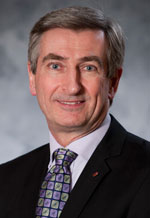 Dr. Robert MacGregor
Dr. Robert MacGregor
Access to care remains one of the major challenges facing our profession today. This issue is multi-dimensional, encompassing geographic, financial, physical, motivational and human resource components. Given the breadth of the barriers that prevent some Canadians from equitable access to oral health care, CDA and the provincial dental associations have decided to concentrate their efforts on access to care for seniors and children as priority areas.
These areas were identified as priorities by the CDA Board of Directors some time ago, as part of CDA's ongoing environmental scanning. The Board tasked the CDA Committee on Scientific and Clinical Affairs (CCSA) to consult with national experts on seniors' oral health and produce a report with specific recommendations. This report confirmed that Canadians are now living longer and are maintaining more of their natural teeth as they age. This results in unique patterns of disease and greater challenges in addressing the oral health care needs of seniors, especially those who are medically or physically compromised.
In an effort to improve the oral health of our seniors, the CCSA report contained recommendations touching on education, delivery of care, research and strategic planning. The specific actions identified for implementation continue to be some of CDA's ongoing activities.
The CCSA further produced a resource for dentists titled Optimal Health for Frail Older Adults: Best Practices Along the Continuum of Care. This document offers advice to practitioners about the concept of providing rational dental care for elderly patients, including those with limited access to care such as the homebound or those living in long-term care facilities. This resource was created to help ensure that the elderly continue to have access to care, regardless of their health status or living conditions.
Moving from one extreme of the life cycle to the other, the CDA Board also identified the need to gather information on the oral health of children, and specifically on early childhood caries (ECC). The CCSA created a task force and produced a report that showed a significant increase in the primary tooth decay rates of Canadian preschool age children over the last 20 years. While indigenous preschool children are reported to have a higher burden of dental caries, as indicated in the recent Inuit Oral Health Survey Report, ECC is found in children from all socioeconomic groups.
In fact, ECC is so prevalent in Canada that pediatric dental surgery under general anesthesia continues to be the most common surgical outpatient procedure at most pediatric hospitals. The CCSA report took a pragmatic approach in its recommendations and supporting actions, which are currently being reviewed and prioritized by the profession.
The next step in addressing these targeted areas of access to care is the recent formation of a National Coordinating Working Group on Access to Care for Children and Seniors. Composed of representatives from across the country, including from CDA's clinical, specialist and advocacy committees, this group will be looking to inform providers and governments of CDA's position on access to care. The goal is to have organized dentistry in Canada working together to implement consistent access to care advocacy initiatives throughout the country. Once progress is made in these areas, the working group's mandate could expand to include other population groups.
We can all agree that oral health is an integral part of general health and that all Canadians have the right to good oral health. CDA supports this right and will continue to encourage efforts by the profession to ensure fair and equal access to oral health care as a basic right.
Robert MacGregor, BSc, DDS
president@cda-adc.ca
